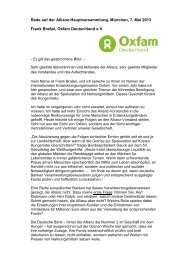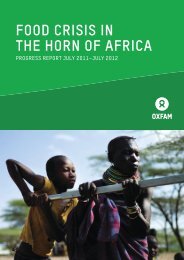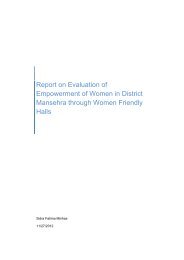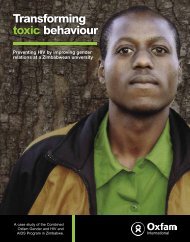No Time to Lose - Oxfam
No Time to Lose - Oxfam
No Time to Lose - Oxfam
Create successful ePaper yourself
Turn your PDF publications into a flip-book with our unique Google optimized e-Paper software.
Introduction<br />
In March 2011, Afghan President Hamid Karzai announced the first<br />
provinces and cities where responsibility for security would be<br />
handed over <strong>to</strong> the national security forces, commencing July 2011.<br />
The announcement signalled the beginning of a process of transition<br />
that is scheduled <strong>to</strong> conclude with the full transition of responsibility<br />
<strong>to</strong> the Afghan National Security Forces (ANSF) by 2014. But as security<br />
continues <strong>to</strong> deteriorate, there are serious concerns regarding the<br />
professionalism and accountability of the security forces that will be<br />
left behind.<br />
2010 was the deadliest year for Afghan civilians since 2001. As in<br />
previous years, armed opposition groups continue <strong>to</strong> account for the<br />
highest number of civilian casualties; but the national security forces<br />
also account for substantial civilian harm. Such harm is caused in violation<br />
of human rights and humanitarian law, as well as during the<br />
course of lawful combat operations. And despite billions of dollars<br />
poured in<strong>to</strong> security sec<strong>to</strong>r reform over the past decade, accountability<br />
for violations is seriously lacking, as are mechanisms for appropriately<br />
responding <strong>to</strong> harm caused during lawful operations.<br />
There is growing awareness amongst some within the International<br />
Security Assistance Force (ISAF), and some components of the Afghan<br />
Ministries of Interior and Defence, regarding the need <strong>to</strong> urgently develop<br />
the professionalism and accountability of the ANSF. But this<br />
has not been translated in<strong>to</strong> effective action on the ground; and at the<br />
international level the apparent lack of awareness regarding the gravity<br />
of the problem borders on complacency. The US Government’s<br />
most recent progress report on Afghanistan was almost silent on the<br />
issue of accountability, with its assessment of the Afghan National<br />
Army (ANA) referring exclusively <strong>to</strong> operational effectiveness. 1 The<br />
UK’s December 2010 progress report stated that ‘the capabilities of the<br />
ANSF are … improving through training, partnering, men<strong>to</strong>ring and<br />
experience in the field’ 2 , and the January report noted only that ‘progress<br />
continues <strong>to</strong> be made’. 3 In late 2010, responding <strong>to</strong> a question<br />
regarding the UK’s role in building professional, accountable security<br />
forces, one senior military official replied simply that ‘we cannot control<br />
how Afghans fight’. 4<br />
Afghan communities desperately want security, and have high hopes<br />
for their own security forces. But a perceived lack of accountability<br />
for abusive conduct, as well as ‘collateral damage’ followed by neither<br />
apology nor redress, undermines the perceived legitimacy of the Afghan<br />
government and makes those high hopes appear misplaced.<br />
States providing support <strong>to</strong> the ANSF can influence how Afghans<br />
fight, and doing so is not only a political and moral imperative but<br />
5






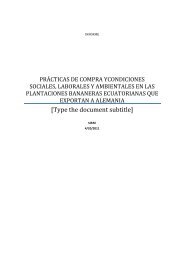
![Download: Faltposter EU-Handelspolitik [PDF 2,17MB] - Germanwatch](https://img.yumpu.com/25095854/1/190x161/download-faltposter-eu-handelspolitik-pdf-217mb-germanwatch.jpg?quality=85)
